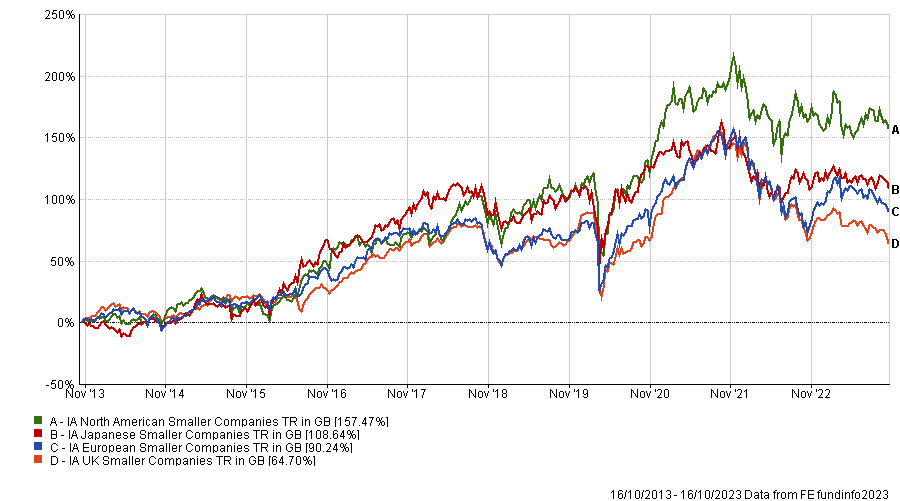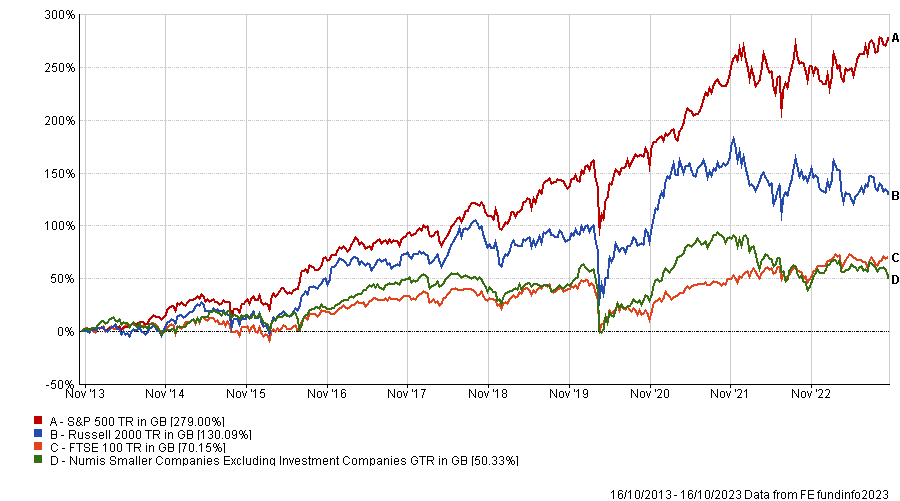Providers will often charge higher fees for their smaller companies funds as small-caps are more expensive to research and trade.
The theory is that managers are more likely to generate alpha in the lower divisions of the market, which means that the outperformance should thus make up for the higher fees.
Trustnet has researched the smaller companies funds that have delivered on this promise over the past 10 years. We have chosen an ongoing charge figure of 1% or as a definition of an expensive fund and retained those achieving top quartile returns over 10 years in a combined universe mixing the IA UK Smaller Companies, IA North American Smaller Companies, IA European Smaller Companies and IA Japanese Smaller Companies sectors.
Among the six funds reflecting our criteria, four are part of the IA North American Smaller Companies sector, which is also the best performing smaller companies sector over 10 years.
The 'expensive' smaller companies funds that have made top quartile returns over 10yrs
Source: FE Analytics
T. Rowe Price US Smaller Companies Equity Fund has been the best, returning 256% to investors. The fund is a best ideas strategy, holding 150 to 200 stocks and Darius McDermott, managing director at FundCalibre, said it “differs from the usual T. Rowe Price mould” as it is a “more balanced core portfolio investing in both growth and value opportunities in the small- and mid-cap space”.
“Winners are allowed to run as long as there is a return opportunity, so the portfolio is likely to have more of a mid-cap bias than its peers.”
Curt Organt has been managing the fund since 2019 but will retire in September 2024. Therefore, Matt Mahon joined last month as co-portfolio manager and will become the strategy’s sole portfolio manager after Organt’s departure.
Performance of sectors over 10yrs

Source: FE Analytics
Similarly, Brown Advisory US Small Cap Blend takes a balanced approach encompassing both value and growth stocks.
Rob Morgan, chief analyst at Charles Stanley, said: "Brown Advisory are experienced and well-resourced US small cap investors. Through their disciplined bottom-up investment process the managers have carved out a successful stock picking record in an exceptionally varied universe and both these funds can be considered good quality options within their sector."
Brown Advisory US Small Cap Blend is a sister fund of the larger Brown Advisory US Smaller Companies, which has more of a growth tilt, benchmarking itself against the Russell 2000 Growth Index. Morgan added that the former fund is more suitable for investors wishing to take a more "style agnostic" approach to the sector.
FTGF Royce US Small Cap Opportunity, which has an OCF of 1.22%, has also delivered for investors over the past 10 years. The fund looks for American companies reflecting at least one of those situations: undervalued growth, unrecognised asset values, turnarounds and ‘interrupted earnings’.
McDermott said: “This fund invests at least 70% of the portfolio in small- and micro- caps and has a value tilt with the managers looking for opportunistic situations in undervalued securities. Given value has been out of favour for the past decade, its performance has been excellent.”
Other IA North American Smaller Companies funds making the cut include NB US Small Cap.
Despite being the most represented sector in our list, it is worth noting that US small-caps have generally underperformed their large-cap peers over the past decade. This is also true for the four funds which have all outperformed their respective benchmark but failed to beat the S&P 500 in the period measured.
Performance of indices over 10yrs

Source: FE Analytics
Closer to home, Liontrust UK Smaller Companies made it on the list of the best performing expensive smaller companies funds. The fund, managed by FE fundinfo Alpha Managers Anthony Cross and Julian Fosh as well as Alex Wedge, Victoria Stevens and Matthew Tonge, has returned 165.5% to investors.
According to analysts at Square Mile, the managers look for steady businesses benefiting from a competitive edge and that are gradually growing and generating high levels of cash.
“The emphasis here is very much on a firm's intangible strengths, which by their very nature are difficult to assess using more traditional analytical techniques and therefore are often overlooked by many market participants,” the analysts stated in a note.
Furthermore, the fund does not invest in companies where the management team do not own at least 3% of the firm’s equity. This is to ensure that the management team is aligned with investors.
Similarly to the US, smaller companies have underperformed their larger peers in the UK, but the Liontrust UK Smaller Companies fund has managed to beat both small-cap indices as well as the FTSE 100.
Finally, Janus Henderson Horizon Japanese Smaller Companies, managed by FE fundinfo Alpha Manager Yunyoung Lee, has returned 165.5% to investors over 10 years.
The manager focuses on stock valuation, long-term structural growth and catalysts to identify Japanese small-caps he believes can drive earnings and returns.





